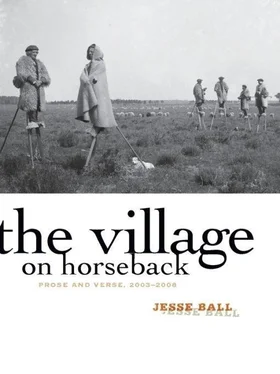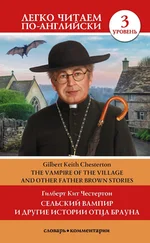Jesse Ball - The Village on Horseback - Prose and Verse, 2003-2008
Здесь есть возможность читать онлайн «Jesse Ball - The Village on Horseback - Prose and Verse, 2003-2008» весь текст электронной книги совершенно бесплатно (целиком полную версию без сокращений). В некоторых случаях можно слушать аудио, скачать через торрент в формате fb2 и присутствует краткое содержание. Год выпуска: 2011, Издательство: Milkweed Editions, Жанр: Современная проза, Поэзия, на английском языке. Описание произведения, (предисловие) а так же отзывы посетителей доступны на портале библиотеки ЛибКат.
- Название:The Village on Horseback: Prose and Verse, 2003-2008
- Автор:
- Издательство:Milkweed Editions
- Жанр:
- Год:2011
- ISBN:нет данных
- Рейтинг книги:5 / 5. Голосов: 1
-
Избранное:Добавить в избранное
- Отзывы:
-
Ваша оценка:
- 100
- 1
- 2
- 3
- 4
- 5
The Village on Horseback: Prose and Verse, 2003-2008: краткое содержание, описание и аннотация
Предлагаем к чтению аннотацию, описание, краткое содержание или предисловие (зависит от того, что написал сам автор книги «The Village on Horseback: Prose and Verse, 2003-2008»). Если вы не нашли необходимую информацию о книге — напишите в комментариях, мы постараемся отыскать её.
Samedi the Deafness
The Way Through Doors,
New Yorker’s
The Village on Horseback
The Village on Horseback: Prose and Verse, 2003-2008 — читать онлайн бесплатно полную книгу (весь текст) целиком
Ниже представлен текст книги, разбитый по страницам. Система сохранения места последней прочитанной страницы, позволяет с удобством читать онлайн бесплатно книгу «The Village on Horseback: Prose and Verse, 2003-2008», без необходимости каждый раз заново искать на чём Вы остановились. Поставьте закладку, и сможете в любой момент перейти на страницу, на которой закончили чтение.
Интервал:
Закладка:
Was it strange to think of a red fox in all that grayness, running with a white goose in its mouth? Many dreamed it, and wept upon waking, so lovely was the drawing in and out of breath in the goose’s heaving chest.
— The green book, said they one to another.
Elsbeth passed by the kitchens but did not look in. Her sister looked up and saw her, but said nothing. She knew the degree, the direction of her thought. For once many had thought Pieter would ask Elsbeth’s hand. But he had not, and then he had fallen out with Algren Johns and Leonard Falk, and had fought them together, with Saul Cross and Imren Jacoby, Locke Arsten and Jaim himself as witnesses, and Pieter had shot them both through the chest with a pistol. Yet Falk had been just as quick. Wounded by Falk’s pistol ball, Pieter had staggered off into the woods. That had been twenty-five years ago. There hadn’t even been a search for him. His mother had gone through the town again and again, begging for help. But something about Pieter had been dark, and no one would help. Catha’s father had forbade them to go, and they had not. Then there was the matter of Algren Johns’, of Leonard Falk’s funeral. Time had simply passed, and drawn a quiet over the whole business.
If Elsbeth was as serious as earth on earth, then this last week had seen her grow grimmer still. Catha worried and worried, and by the fence with Jaim at first light, she’d asked him what they ought to do.
His face hadn’t changed. He’d said nothing at first, and then,
— Something’s likely to be done. Things can’t go on like this.
And now there was the meeting. Anders Lew had knocked on the window at half three to announce it. What would be said? She shuddered in spite of herself and hurried on with the preparations for supper.
One bell. Two bells. Three bells in the dusk, and the people came through the streets.
Elsbeth walked with her sister. Jaim trailed behind, speaking to the smith, Canter Maynard.
So many steps in the thin darkness of the town. Lamps were at every corner, and the wood gave a comfort, a drumming as of life.
As she walked, Elsbeth thought of the pattern she’d begun that morning. She could see all the threads in her head, could watch them shaking and forming together, twining and joining. She wanted then to go to the shop and sit down at her loom, but her sister’s hand on her shoulder recalled her.
— Are you all right?
— Just thinking.
And then they were at the meeting house. And then they were taking seats near the back. Almost the whole town was there, some three hundred. Only half the farmers, of course. The flocks and fields had, after all, to be watched, most of all now.
Looking around, Elsbeth saw fear in the shapes of backs and necks, the imposition of heads on necks, the taking up of gowns and blankets, hands, white and gaunt, pressed against the benches.
How could she, of all people, find her way through this maze of confused words and thought?
The Mayor stood to speak.
He called for order, and after awhile, the rumbling ceased.
— I stand here before you as an act of free election.
It was the invocation called for at the beginning of every meeting.
— A matter has risen that needs a consensus. The murderer Pieter Emily has been discovered living not fifteen miles from this spot where I stand.
A great noise then rose up in the hall. Rumor, certainly, had had its way with the town. Everyone had heard Jaspar Mign’s tale, whether from he or another. But this was the first general confirmation of its truth.
— Order, order, shouted the Mayor.
He slammed a staff down on the raised platform and the crowd grew quiet.
— The facts of the matter, said the Mayor. Pieter Emily vanished almost 26 years ago, leaving two of the town dead. It matters not at all that it was a duel, or that they were two and he one. The rules forbade such duels then, just as they do now.
A man spoke up in the third row.
— My daughter saw a man inside our house not two days ago. From what we can tell, it was Pieter Emily!
A din rose up at this, with nearly every member of the town declaring themselves aggrieved in one way or another.
Then Jaspar Mign stood up, and all fell silent.
— He said the green book, said Jaspar. He said the green book, and now this is on us.
The meeting fell into chaos and nothing could be done for some time, with some swearing that Pieter was to blame for all the present ills, and others swearing that he was not. Someone began to draw up a vote on the matter, and the white and black painted sticks were brought out in the long, iron box, but the measure failed, and no vote was taken. Finally, the candles burned down and the meeting was closed, to be resumed on the next day, and everyone was sent home.
Elsbeth prepared herself for sleep. She laid her dress across a chair back, and stood by the window looking out across the hills. The night was clear and bright, and her sharp eyes could see far.
The village was in a hollow. It was like a great, wooden apparatus, laid out flat upon the ground. Hills and fields lay all around, and mountains as well. Mountains took up three horizons, and farther, the fourth. It was a long vale, and the road that ran down from Firsk to the far mountains was the low road. No one traveled it, or spoke of it. The town looked East, through the mountains. East was where trade was. East was the world. To the West, who knew? People had gone there once. But the green book had been written during a time of trouble in the village, and by following its rules, the village had grown and prospered. Look east, urged the green book. Do not take the low road.
Elsbeth shivered in the sudden cold and ran her hands over the thin bones of her ribs, the flatness of her stomach, her narrow legs. She ate rarely, her sister told her, but Elsbeth thought rather that she was like the threads of the loom, that she had grown only more like them with time, and that it was this oneness that allowed her her single pleasure.
For to see the shuttle in her hands was like nothing else, like air through air, like needles through needles.
The first sleep came and went. Elsbeth rose and set to her ledgers. She could do nothing with them, though, and in the midst of turning a page, she was pierced by the sudden remembrance of a dream.
A child was blowing a whistle louder and louder, and as the whistle grew in sound, the wind came through the teeth of the mountains and the town began to break.
Elsbeth was in the meetinghouse again, and the meeting continued. But all the townspeople were dressed as animals. They wore the clothes of men, but each had the head of some sheep, some cow, some dove or swan or rat. A mouse with a stick stood on the platform. A frog with a drawn dagger raised it up in a webbed hand. She felt at her own face, but there was nothing there to feel, and she was again in the snow at the day’s edge, where light was just breaking through a closing door.
I must speak to him, she thought.
— I must warn him, she said.
And the rustling of night that was listening at the window went away like salt over a shoulder.
Elsbeth dressed. She stood at the very center of the room. The tenth bell rang. She sat heavily on the floor. She stood again.
There are children among us, and in us, she thought. We are guided by what we have been just as much as what we are. If I was at his side so often in the past, should I not now go to see what has become of the present time?
And in a room below, Catha sat with Jaim talking, and Jaim said it had been declared by many that Pieter would be brought to trial.
Yet he disapproved.
— It was no fault of his, said Jaim slowly. Falk had it in for him from the first, and goaded him and goaded him.
Читать дальшеИнтервал:
Закладка:
Похожие книги на «The Village on Horseback: Prose and Verse, 2003-2008»
Представляем Вашему вниманию похожие книги на «The Village on Horseback: Prose and Verse, 2003-2008» списком для выбора. Мы отобрали схожую по названию и смыслу литературу в надежде предоставить читателям больше вариантов отыскать новые, интересные, ещё непрочитанные произведения.
Обсуждение, отзывы о книге «The Village on Horseback: Prose and Verse, 2003-2008» и просто собственные мнения читателей. Оставьте ваши комментарии, напишите, что Вы думаете о произведении, его смысле или главных героях. Укажите что конкретно понравилось, а что нет, и почему Вы так считаете.












